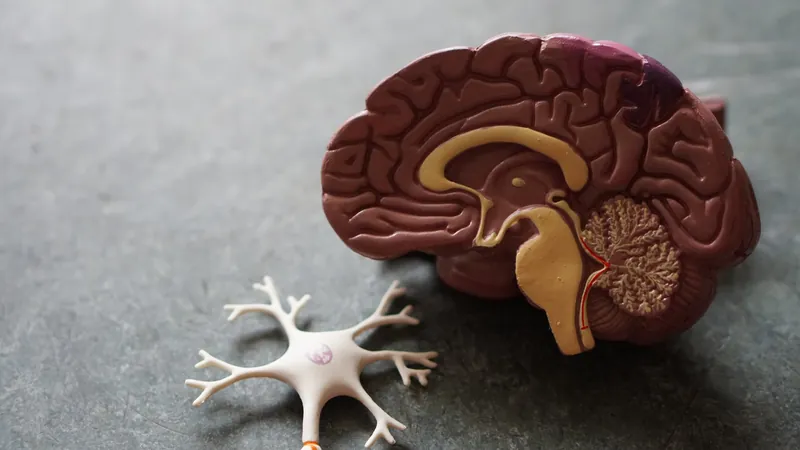
Revolutionary AI Tool Set to Transform Multiple Sclerosis Treatment Monitoring
2025-04-08
Author: Michael
Researchers from University College London (UCL) have unveiled an exciting new artificial intelligence (AI) tool named MindGlide, which promises to revolutionize how treatments for multiple sclerosis (MS) are monitored and assessed. This cutting-edge technology leverages AI to analyze MRI brain images, enabling the detection of subtle changes linked to MS that have historically been challenging to identify.
Understanding Multiple Sclerosis
Multiple sclerosis is a debilitating condition that occurs when the immune system mistakenly attacks the protective sheath (myelin) covering nerve fibers in the brain and spinal cord. This leads to a variety of physical, cognitive, and emotional hurdles for those affected. In the UK alone, around 130,000 individuals live with MS, costing the National Health Service (NHS) an estimated £2.9 billion every year. Monitoring the disease typically entails the use of MRI scans, which track alteration in brain structures.
Traditionally, assessing MS progression has required specialized MRI scans to capture essential details, but such targeted imaging is not conducted routinely, leading to a gap in essential monitoring processes.
The Breakthrough Capability of MindGlide
MindGlide bridges this gap by employing advanced AI algorithms to assess regular MRI scans that are essential in clinical settings. This allows healthcare providers to swiftly obtain critical information regarding brain damage, lesions, and even early indications of brain shrinkage—all of which are pivotal indicators of the disease.
Unlike conventional methods, which may take weeks for manual analysis due to the sheer volume of scans processed by the NHS, MindGlide delivers results in a matter of seconds—typically within five to ten seconds. In a recent significant study featured in the journal Nature Communications, researchers evaluated MindGlide using over 14,000 MRI images from more than 1,000 MS patients. Remarkably, it surpassed two other AI tools previously used for similar functions, showing an approximate 60% improvement over SAMSEG and 20% better performance specific to WMH-SynthSeg when identifying brain plaques—key indicators of disease activity.
Unlocking New Insights and Enhancing Patient Care
Not only can MindGlide pinpoint lesions on the brain's outer layers, but it also detects changes in deeper structures, providing a holistic view of the disease's progression. The tool's effective performance spans both short-term and long-term scans, making it a valuable resource for initial evaluations and continuous monitoring alike. Moreover, the technology has validated existing high-quality research regarding MS treatments, revealing their efficacy in slowing or halting the disease's progression.
One of MindGlide's most significant breakthroughs is its ability to extract meaningful insights from a plethora of existing MRI data that had previously been underutilized due to quality constraints. By analyzing lower-quality images, which might not have met the standards for expert review, MindGlide facilitates a deeper understanding of MS and informs personalized treatment strategies for individuals.
As researchers continue to refine and enhance this AI tool, the potential for faster, more accurate diagnoses and optimized treatment plans tailored to each patient becomes increasingly tangible. The introduction of MindGlide heralds a new era in multiple sclerosis management, offering hope for improved patient outcomes and an overall better quality of life for those living with this challenging condition. This AI breakthrough could mark a turning-point in how MS is understood and treated, making it a topic to watch in the healthcare landscape.









 Brasil (PT)
Brasil (PT)
 Canada (EN)
Canada (EN)
 Chile (ES)
Chile (ES)
 Česko (CS)
Česko (CS)
 대한민국 (KO)
대한민국 (KO)
 España (ES)
España (ES)
 France (FR)
France (FR)
 Hong Kong (EN)
Hong Kong (EN)
 Italia (IT)
Italia (IT)
 日本 (JA)
日本 (JA)
 Magyarország (HU)
Magyarország (HU)
 Norge (NO)
Norge (NO)
 Polska (PL)
Polska (PL)
 Schweiz (DE)
Schweiz (DE)
 Singapore (EN)
Singapore (EN)
 Sverige (SV)
Sverige (SV)
 Suomi (FI)
Suomi (FI)
 Türkiye (TR)
Türkiye (TR)
 الإمارات العربية المتحدة (AR)
الإمارات العربية المتحدة (AR)